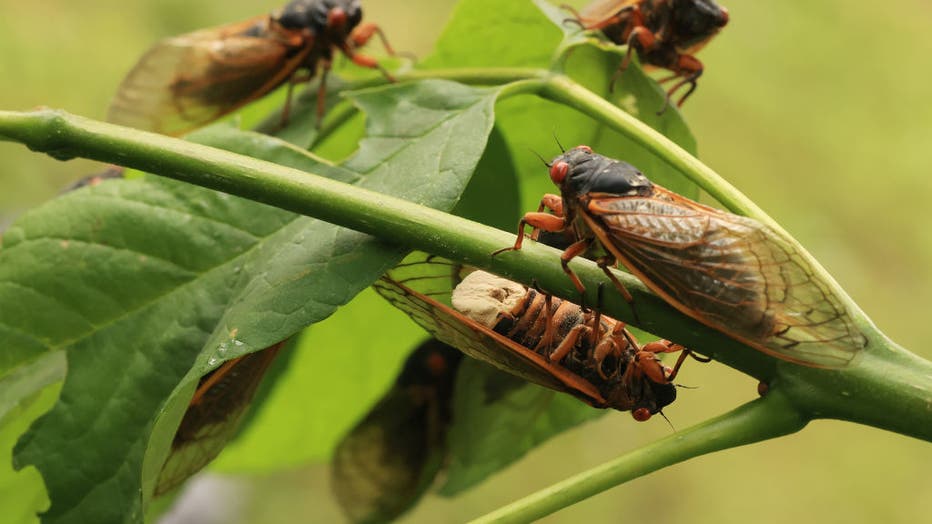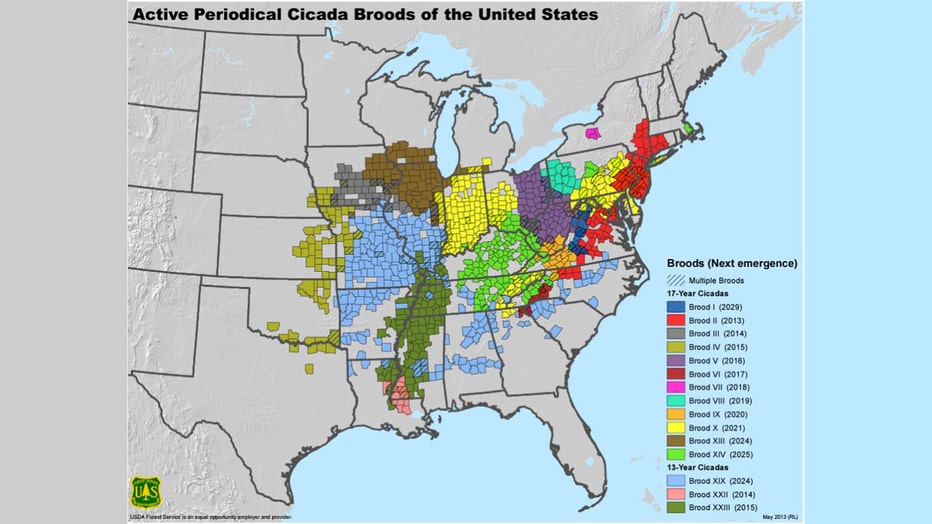When do cicadas come out in 2024? What to know ahead of the bug's emergence in Georgia
Two Magicicada periodical cicada engage in a mating process on May 25, 2021 in Takoma Park, Maryland. (Photo by Chip Somodevilla/Getty Images)
ATLANTA - Get ready, Georgia. Trillions of cicadas are waking up and getting ready to make their presence known in a big way in 2024.
For the first time in over 220 years, the two broods of the loud bugs will emerge from their years-long sleep underground and take over backyards around Georgia and across the country.
Most cicada species come out annually, but two periodical broods of the insect in the United States stay underground for 13 or 17 years. 2024 is the first time both will be above ground for the first time since Thomas Jefferson was president.
MAP: HERE'S WHERE THE DOUBLE BROODS OF CICADAS WILL EMERGE IN 2024
What are cicadas?
They are a family of insects called magicicadas. They belong to a group of bugs that are different from other insects in that both the nymphs and adults have a beak they use to drink plant fluids. Adults have two sets of wings.
There are more than 190 known varieties of cicadas in North America and 3,390 of them around the world.
Most cicada species come out every year. In the United States, there are groups of cicadas that stay underground for either 13 years or 17 years. These are called periodical broods.
Except for one species in India and one in Fiji, only the U.S. gets these periodic cicadas.

Showing a plug of yellow spores where its abdomen used to be, a Magicicada periodical cicada infected with a fungal parasite mimics female mating behavior in an attempt to get close to non-infected cicadas at Fairland Recreational Park June 01, 2021
When will cicadas come out in 2024?
Cicadas usually begin emerging in late April and May when soil temperatures reach 64 degrees Fahrenheit. The bugs will continue emerging through May and June.
While the last few years have seen all the country's cicada broods sleeping soundly, this year, we can expect Brood XIX, the 13-year cicadas, known as the Great Southern Brood, and Brood XIII, the 17-year cicadas, considered the Northern Illinoise Brood.
The next time both broods align will be centuries later in 2245.

The two broods that will emerge simultaneously in 2024 are Brood XIX (the 13-year cicadas) and Brood XIII (the 17-year cicadas). A U.S. Forest Service map shows where both are typically located, indicated in brown and light blue. (Credit: U.S. Forest
Where will cicadas come out?
Brood XIII will come out in Illinois, Indiana, Iowa, Michigan and Wisconsin.
Brood XIX will come out in Alabama, Arkansas, Georgia, Iowa, Kansas, Kentucky, Louisiana, Maryland, Mississippi, Missouri, North Carolina, Oklahoma, South Carolina and Tennessee.
Are cicadas dangerous?
No. They don’t harm people. They don’t harm pets. Don’t kill them, scientists say.
Dogs have been known to binge and eat too many. But that’s a function of the number, not the bugs themselves.
The only things cicadas can harm are young trees if they climb up them and try to plant eggs on weak young limbs. Experts say netting young trees protects them. Do not use pesticides.
When cicadas die, they fertilize the trees and may smell a bit. Trees tend to bloom more in the year after a cicada emergence, says cicada expert Gene Kritsky.
While they aren't dangerous, they can be extremely loud when the males are trying to woo a mate. A mass of cicadas can reach 105 decibels, which is louder than your average lawnmower.
When will the cicadas leave?
Once the males mate, they die. After females lay their eggs, they die.
So, except for the eggs, the bugs will be gone by around July 4. Annual cicadas can last until October.
When a lot of them die in the same place, it can "smell like roadkill," Cooley says. "Get a shovel or a rake and move them somewhere far away," entomologist John Cooley suggests.
You can report cicada sightings on cicadasafari.org.
The Associated Press contributed to this report.

